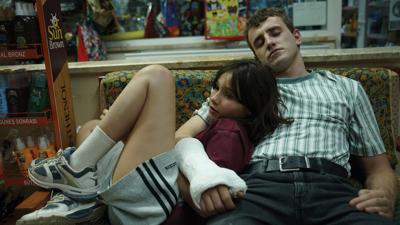In Aftersun, cameras are time machines. They’re a means of capturing the present — to understand it in the future, to relive what you can’t fully process in the now, to help you grapple with it later. Capturing images of those we love keeps those people alive long after they’re gone, and keeps a piece of our lives eternally frozen in a single, precious moment. These images are a fuel for memories, good and bad.
Scottish filmmaker Charlotte Wells uses her directorial debut as a way to deal with her past. Aftersun follows Wells’ cinematic stand-in Sophie (Celia Rowlson-Hall), who digs through recorded archives featuring her father Calum (Paul Mescal). We’re never fully sure what information about her dad Wells’ avatar is looking for, but it’s clear what she finds.
Through splices of filmed memories and remembered ones from a Turkish vacation in the late 1990s (Frankie Corio plays young Sophie), Wells’ film dissects this father-daughter relationship. There are people doing the Macarena during resort dinners, as well as a moment in which a daughter uses a karaoke rendition of REM’s “Losing My Religion” to express her emotions. This footage and these moments make it easy for the viewer to remember their own childhood, as Wells’ attention to detail brings that time back to life — the little moments serve as totems to drag us back into the past, whether we like it or not.
Most of the film is told through quiet observation, piecing together snippets from the father-daughter vacation to paint a fuller picture of a man Wells — and Sophie — might not have fully understood when she was young. As the saying and the lyrics go, we wish we knew when we were young what we know now. Aftersun is a painfully authentic reminder that we may never understand the full humanity of the ones who raised us until we walk in their shoes. But once we do, they become even more dear to us. Their flaws become ours, and their virtues remind us of the best parts of ourselves. Aftersun shows how bittersweet that balance can be.
Mescal and Corio really pull your heartstrings as a father and daughter who clearly love each other, even when they don’t always connect. They both give stellar performances and keep the film relatable. Sophie finds mystery in her father, likely mystery that she will continue to unpack and process long after the credits roll. The truth about Calum explodes in Aftersun’s third act, when a low-key film cranks it up to 11 and delivers a finale and needle-drop that will likely devastate and challenge you in ways you didn’t expect.
If you let it, Aftersun will break your heart open and spill all of your childhood memories on the theater floor. It may also move you to find empathy and acceptance for your parents that you never knew were lacking. It’s a truly brilliant film, and one that might just change the way you look at where you came from and the people who made you.





